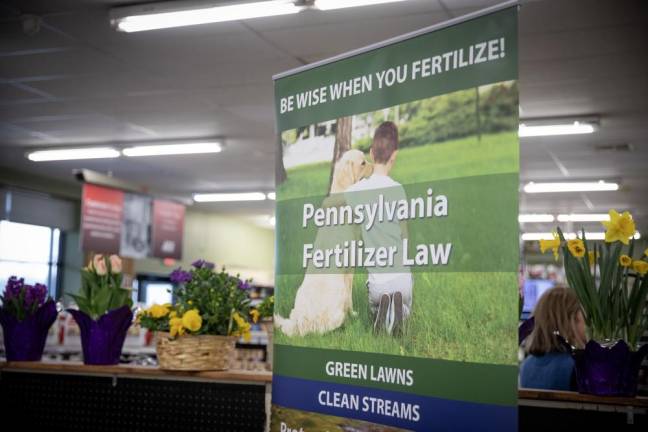State highlights updated ‘fertilizer law’
Milford. The law aims to reduce over-application to reduce runoff.

Pennsylvania’s Agriculture Secretary, Russell Redding recently reminded residents of changes to Pennsylvania’s fertilizer law aimed at helping residents manage their lawn care in a cost-effective and environmentally sustainable way.
The revisions to the Pennsylvania Fertilizer Law, signed by Governor Josh Shapiro in 2023, brought new responsibilities to homeowners and residents who apply fertilizer to their lawns, requires clearer fertilizer labels to help homeowners understand fertilizer needs and avoid costly over-application, and keeps Pennsylvania on track to meet its Chesapeake Bay goals.
“The agriculture community has long balanced the need for production with the need for environmental stewardship,” said Secretary Redding. “By expanding this responsibility to all who are using and applying fertilizer, we are creating healthier soils and water in the Commonwealth, while promoting an economic savings that can be realized through reviewing and understanding nutrient management.”
Homeowners and residents are required to be aware of and to follow the nutrient application rate limits, fertilizer application location restrictions, and best management practices as specified in the law and written on the product label. Overuse of fertilizer not only harms the environment but can waste products and can be costly to residents.
The modernized law focuses on educating homeowners on proper application, preventing unnecessary spending and runoff that pollutes rivers and streams.
“Excess nutrient runoff from fertilizers can lead to increased levels of nitrates in drinking water and can harm fish and aquatic life in streams and lakes,” DEP Director of Watershed Restoration and Nonpoint Source Management Jill Whitcomb explained. “These enhancements made to the Fertilizer Law will help residents throughout Pennsylvania improve their local waters, as well as those that flow in the Ohio River, the Delaware River, and the Chesapeake Bay.”
According to the law, fertilizer labels will now be clearer, with instructions for proper use, best practices, and guidance on handling, storage, and disposal. The state will also use “enhanced reporting” to help track fertilizer use and ensure Pennsylvania meets environmental goals. The Department has launched a consumer awareness campaign through the Bureau of Plant Industry, working with partners like Penn State Extension, the State Conservation Commission and the PA Landscape and Nursery Association, to connect residents with education, support, and resources to so they may effectively use their fertilizer and other nutrients.
“Educating consumers on the proper way to apply lawn fertilizer and at appropriate rates will not only protect our water quality in Pennsylvania, but will result in a healthier lawn,” said Gregg Robertson of the Pennsylvania Landscape & Nursery Association. “Research by EPA has shown that a healthy lawn will reduce runoff of nitrogen, phosphorus and sediment into our rivers and streams.”
Learn more about the Pennsylvania Fertilizer Law at agriculture.pa.gov/fertilizer.